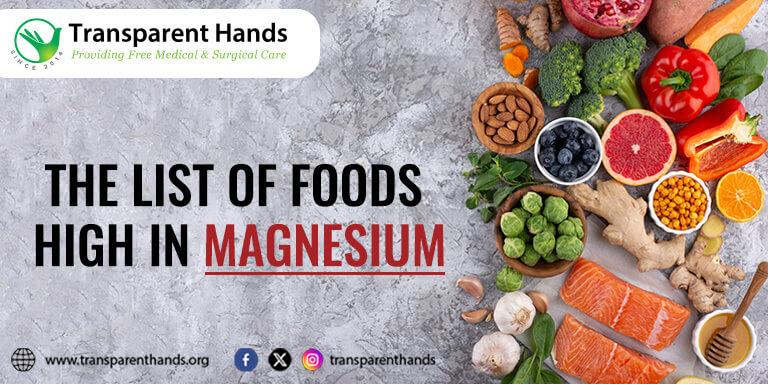The List of Foods High in Magnesium

Magnesium, the quiet workhorse of minerals, might not boast the flashy allure of vitamin C or the muscle-building prowess of protein, but its role in our health is nothing short of magnificent. From regulating blood pressure and enhancing energy production to maintaining strong bones and a calm mind, magnesium touches nearly every aspect of our well-being. Yet, despite its vital importance, this essential mineral often goes unnoticed, leading to deficiencies that can impact our health in subtle, yet significant ways. In this blog we’ll explore the sources of magnesium in foods, and what some of the natural magnesium-rich foods are.
The List of Foods High in Magnesium
- Avocados
- Bananas
- Yogurt
- Sweet potatoes
- Leafy Greens
- Nuts and Seeds
- Legumes
- Dark Chocolate
- Whole Grains
Lets explore the sources of magnesium in foods:
The list of magnesium-rich foods extends far beyond the usual food options. Avocados (37mg per 100g), bananas (32mg), yogurt (42mg), and even sweet potatoes (41mg) can contribute significantly to your daily magnesium intake.
The good news is that magnesium deficiency is largely preventable, and the key lies in our plates. Nature has generously sprinkled this vital mineral in a diverse array of delicious foods, waiting to be unlocked. So, ditch the supplements for now and embark on a culinary adventure to discover the best sources of magnesium, hidden in plain sight
Leafy Greens
These nutritional powerhouses reign supreme when it comes to magnesium. A single cup of cooked spinach delivers a whopping 157mg of magnesium, while Swiss chard and kale offer a respectable 84mg and 41mg respectively. Incorporate these leafy wonders into salads, smoothies, or sauteed dishes for a potent dose of magnesium goodness.
Nuts and Seeds
Nature’s tiny nutritional titans pack a significant punch of magnesium. Almonds top the charts with 205mg per 100g, followed by pumpkin seeds (168mg) and cashews (176mg). Sprinkle them on salads, yogurt, or cereal, or munch on them as a healthy snack to fill your magnesium quota.
Legumes
These protein-rich powerhouses are not just satiating but also surprisingly high in magnesium. Black beans deliver 122mg per 100g, while lentils pack in 70mg. Enjoy them in soups, stews, dips, or even burgers for a satisfying and magnesium-rich meal.
Dark Chocolate
Who says indulgence can’t be nutritious? Dark chocolate with at least 70% cocoa content offers a delightful dose of magnesium (76mg per 100g) alongside antioxidants and heart-healthy fats. However, delicious as it may be, it’s better to enjoy it in moderation as it is loaded with calories too.
Top 10 Superfoods for Weight Loss
Whole Grains
Ditch refined foods and replace your plate with whole grains. Grains like oats, brown rice, and quinoa boast of a significantly high level of magnesium per 100g i.e. 81mg, 48mg, and 86mg respectively. Known as complex carbohydrates, they can provide fiber, a great dose of magnesium, and even sustained energy, making them the perfect choice for any meal of the day.
Embracing a Balanced Diet
While focusing on magnesium-rich foods is crucial, remember that a balanced diet is key to overall health. Include a variety of fruits, vegetables, whole grains, protein sources, and healthy fats in your meals to ensure you’re getting all the essential nutrients your body needs. Listen to your body’s hunger cues, eat mindfully, and prioritize fresh, wholesome ingredients over processed alternatives.
The Symptoms of Magnesium Deficiency
Magnesium deficiency manifests itself with a variety of symptoms that include muscle cramps, fatigue, anxiety, insomnia, and headaches. The severity of the symptoms is of course subjective and when left unchecked, they can transform into long-term conditions such as type 2 diabetes, high blood pressure, and osteoporosis.
When to Consider Extra Magnesium
In some cases, despite a healthy diet, individuals may still require magnesium supplements. This could be due to factors like certain medical conditions, medications, or increased magnesium needs during pregnancy or breastfeeding. Always consult your doctor before taking any supplements, as an excess of magnesium can also be harmful.
End Notes
Magnesium, the silent champion of our health, deserves its moment in the spotlight. By maximizing the sources of magnesium in foods in your diet, you can be a step ahead in your fitness journey. One must remember that food is not only about satiating hunger, it is also about building our health and celebrating life with the vitality we gain from it. So, enjoy natural foods with magnesium and take a step forward in living a healthier and happier life.
(The information in this article should not be taken as a substitute for professional medical advice.)










Leave Your Comments